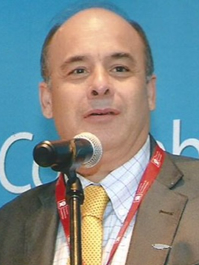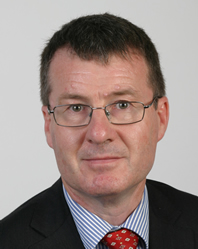Scientific attendees from more than 100 countries will come to the ACR/ARHP Annual Meeting this year, attending educational sessions, workshops, and poster presentations. Many also will serve as speakers and moderators.
Why is the ACR/ARHP Annual Meeting so appealing to a worldwide scientific audience? Because of the quality of the content and its global outlook, say leaders of other rheumatology associations. Many of the more than 450 educational sessions, nearly 4,000 abstracts, and professional networking opportunities offer something for rheumatologists in clinical practice and research, no matter where they work.

“The ACR Annual Meeting is the largest and oldest rheumatology meeting. Every year, it relays up-to-date information, research, and trends in our area of expertise,” says Carlo Vinicio Caballero-Uribe, MD, PhD, Associate Professor of Medicine at Universidad del Norte in Colombia, and the President of the Pan American League of Associations of Rheumatology (PANLAR) for 2016-2018.
Kevin Pile, Professor of Medicine, University of Western Sydney and Campbelltown Hospital, also encourages other international colleagues to make the journey to attend the Annual Meeting.
“This is the peak rheumatology meeting that best caters to the clinical and scientific rheumatologists of the Asia Pacific region,” says Prof. Pile, current President of the Asia Pacific League of Associations of Rheumatology (APLAR). “Incorporating key clinicians and scientists from around the world, the meeting includes presenters from Asia Pacific who disseminate the knowledge and experiences gained by their involvement in the rheumatologic care of over half the world’s population.”

Many sessions on this year’s Basic Science, Clinical Science, and Business/Administration tracks and TechMed sub-track will certainly appeal to rheumatologists from outside the United States, Dr. Caballero-Uribe said.
“One that I find very attractive for our colleagues from the PANLAR area is The Great Debate: To Taper or Not to Taper? Biologic DMARDs in Low Rheumatoid Arthritis Disease Activity,” he said. This year’s debate will take place at 2:30 PM Sunday, Nov. 13.
Another session series, Anatomy for the Clinician, could be of interest to a lot of clinicians in the Americas, said Dr. Caballero-Uribe. Designed as a refresher course for rheumatologists and rheumatology health professionals at any stage of their careers, this pilot series of hands-on sessions focuses on anatomy and regional musculoskeletal problems. They may be especially useful for anyone who uses ultrasound in their clinical practice.
“I would say that clinical topics and guidelines updates are very important for those outside the U.S. to follow,” he said.
Attendees from the Asia Pacific region will enjoy sessions that provide clinical updates on conditions that are common in their patient populations.
“Unique to our area is the burden of gout, severe systemic lupus erythematosus (SLE), and infectious comorbidities,” Prof. Pile said.
Here are a few 2016 sessions that offer the latest research on these topics:
- Living Well With Lupus, Sunday, Nov. 13
- Emerging Systemic Lupus Erythematosus Treatments, Monday, Nov. 14
- Crystal-Related Arthropathies: Beyond Urate, Tuesday, Nov. 15
- Tuberculosis Update, Wednesday, Nov. 16
In addition, APLAR will sponsor an educational session at this year’s Annual Meeting, Research Advances in SLE in the Asia Pacific Region, chaired by Yeong-Wook Song of Korea and Anselm Mak of Singapore. Speakers from Japan, Korea, Hong Kong, and Australia will discuss SLE epidemiology, genetics in the Asia Pacific area, medical treatments, and registry opportunities.
The Annual Meeting’s international scope and broad educational offerings are always valuable to rheumatologists no matter where they work, says Prof. Pile.
“The regional rheumatology leagues continue to strengthen their alliance to globally improve the care of rheumatic and musculoskeletal disorders,” he said. “I commend this year’s meeting to APLAR delegates as the meeting of cutting-edge updates in the science of rheumatology, state-of-the-art clinical overview, and greatest marketplace to meet and network for research and training opportunities.”
Europe-based rheumatologists and rheumatology health professionals will enjoy sessions that provide perspectives that bridge both the U.S. and their continent, including the EULAR/ARHP Pain Management Trends on Monday, Nov. 14. Panelists will explore global trends in pain management and the latest research on how musculoskeletal pain affects patients’ daily lives
